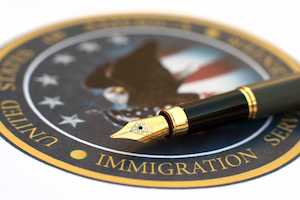By David Jones and Marc Trocinski
The early part of 2021 has shown that change is happening in the world of immigration. Following the presidential election of 2020, President Biden is looking to implement the changes on which he campaigned. However, with the nearly even split of the legislative branch of government, Biden will not be able to implement legislation without agreement from the Republican side of the aisle. If that cannot be found, action on immigration may be limited to executive orders.
U.S. Citizenship Act of 2021
The Biden Administration has put forth the U.S. Citizenship Act of 2021 as a mission statement on its immigration agenda. Due to the 50-50 split in the Senate and nearly equal split in the House of Representatives, it will likely be difficult to pass a comprehensive immigration reform bill, at least early on. Nevertheless, the Biden administration is pushing forth with several areas of potential action.
H-1B Lottery
Falling into the category of “the more things change, the more they stay the same,” the H-1B lottery will be held in the same manner that it was held last year. The H-1B lottery is the annual event in which workers with specialized skills put their names into a drawing in the hopes of gaining the right to work in the U.S. Entrance costs only a $10 fee and the submission of some basic information, but the number of H-1B visas are limited by law to 65,000, with an additional 20,000 visas allocated to applicants holding a master’s degree or higher. The randomly-selected winners are granted the opportunity to apply for a visa to work in the United States for a period of up to three years, with the potential for one additional three-year extension period.
The process had been subject to changes which would have based the allocation of the visas on the wage level of the applicants with higher-earning applicants getting priority over lower-earning applicants. In early February 2021, USCIS announced that the rules instituting the wage-based system would need additional study and made them inactive until at least next year. The U.S. Citizenship Act of 2021 addresses the wage-based rule by requiring that after USCIS completes a study of the idea, it must draft a new rule. Although President Biden did discuss it during the presidential campaign, it is not clear whether the wage-based rule will be implemented, revised or discarded. While that process is being resolved, USCIS also announced the H-1B lottery for THIS year would proceed as it had previously starting on March 9 and ending on March 25 at noon eastern.
STEM Doctoral Candidates
Although the number of H-1B visas was not changed in the new bill, it is likely that the new bill will allow for a higher number of individuals to enter the country with work authorization. The bill would make PhD STEM graduates exempt from the numerical caps of the H-1B visas. This change would have the effect of allowing all STEM PhDs legal entry into the United States, while not having to compete in a lottery with individuals holding lower-level degrees. This change would create an incentive for top STEM talent to pursue a PhD in the United States and also create an increase in the supply of top STEM talent in the United States, addressing the shortfall in the most in-demand form of labor in the market.
Pathway to Citizenship
The piece of the U.S. Citizenship Act of 2021 getting the most attention is probably the “pathway to citizenship.” Most significantly, the bill would cut the time required to acquire U.S. citizenship from 13 years (or more) to eight years for aliens who were present in the United States prior to January 1, 2021. Additionally, the bill provides Temporary Protected Status to aliens who came to the U.S. as children and certain other groups. These individuals would be eligible for legal permanent resident status immediately after meeting requirements and passing background checks.
Green Card Back Log
Over the past thirty years, approximately 200,000 legal permanent resident cards (“green cards”) have been allocated but not issued. The bill seeks to “re-capture” those. Then the re-captured green cards will be re-distributed to individuals currently waiting for green cards to become available in the family-based or employment-based categories. This change is designed to reduce the years or decades-long backlog for some green card applicants.
Diversity Visa
The bill would increase the number of diversity visas from its current limit of 55,000 to a new limit of 80,000 per year. The diversity visa program creates a lottery for immigrant visas which can be entered only by applicants from certain nations which had been under represented in the US immigration system in the preceding 12 years. If selected, the applicant will be eligible to live and work in the United States and receive legal permanent residence status. Unlike other visa types, the diversity visa applicants need not show a family or business tie to the U.S. prior to entering the country.
Terminology
The bill will remove the word “alien” from all U.S. immigration statutes and regulations. In its place the word “noncitizen” will be used to describe any “person not a citizen or national of the United States.”
Per Country Visa Caps
The bill would lift numerical caps placed on individual countries for certain types of visas. This would primarily benefit applicants from countries with large numbers of applicants including India, China and the Philippines.
Other Things to Watch
Non-Legislative Action
The Biden Administration has already issued several executive orders on immigration matters. Among these were reversing actions on refugee admission and resettlement and the Migrant Protection Protocols. There are also executive orders that established a task force to reunite families that had been separated at the US-Mexican border and several orders related to travel protocols amidst the Covid-19 pandemic.
At the same time, some administrative agencies have already taken action in the new administration. As the heads of cabinet departments are approved and sworn, look for more action to be done through these mechanisms.
Stand Alone Bill
Although not included in President Biden’s bill, another bill with the potential to be made into law was submitted by Representative Castro of Texas. That bill would offer permanent resident status to alien workers who have worked front-line jobs during the Covid-19 pandemic and the so-called “Dreamers.” The bill would affect approximately five million aliens.

Memphis Fisher Phillips
djones@fisherphillips.com
www.fisherphillips.com

Memphis Fisher Phillips
mtrocinski@fisherphillips.com
www.fisherphillips.com
